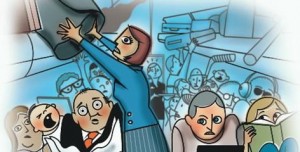While not known as retail innovators banks started charging us all manner of fees for every minutiae some time ago: the bounced check fee, the monthly checking fee, the statement fee, the paperwork fee, the outgoing wire fee, the incoming wire fee, the secondary account fee, the document discovery fee, the check copy fee, etc.
Then airlines jumped on the bandwagon: their cunning ploy to awe us with low fares while simultaneously shocking us with all manner of “ancillary fees”: the checked bag fee, the excess baggage fee, the large baggage fee, the food fee, the drink fee, the ticketing fee, the wifi fee, the check-in early fee, the seat selection fee, the group fee, the fee-fie-fo-fum fee, etc etc.
So, while you may believe that you are a valuable and marketable brand of one, most enterprises actually look upon you something more lowly, but financially attractive — you are nothing more than a cow to be milked, or a landscape to be fracked, of fees. Sadly, this movement towards “personal-fracking” — the monetization and mining of you — has only just entered its early stages. So, hold on tight to your wallet.
From the Guardian:
Fracking. Could there be a more perfect model for how we’re getting rinsed by this current conspiracy of government and commerce? In a world turned upside down, “conservative” now means the absolute opposite of “leaving things as they are”. Conservative means changing everything. It means dismantling things and selling off the bits. It means drilling into our lives and extracting the marrow.
Conservatism and conservation are now about as far apart as it’s possible to get. Friends of Conservation are the ones protecting the countryside. The ones who stand around self-consciously in terrible fancy dress, holding passive-aggressive placards in praise of the noble, selfless badger. Or basically any mammal that looks good in a waistcoat.
Friends of Conservatism, on the other hand, are the ones who roll up on heavy machinery like a pissed Ukrainian militia. The ones who drill deep beneath that area of local countryside whose only “use” so far has been as a picnic site. And who then pump into the ground powerful jets of high-pressure hydrogunk, splintering rock as easily as a walnut. And who, having sucked up a sky’s worth of valuable gas through a massive crack pipe, then pack up and lumber off to fracture and steal someone else’s underground treasure.
Welcome to capitalism’s late late show. If you can power-hose the last drop of value out of something, you now have an amoral imperative to do it. Fracking is the chief inspiration for today’s entrepreneurs, those “heroic wealth creators” so admired by Andy Pandery Burnham and half the Labour party. Everything is up for grabs now. The age of the racketeer is over. It’s all about fracketeering now.
A gang of London estate agents has invented something called a “client progression feeHere is a recent example. A gang of London estate agents has invented something called a “client progression fee”. Yeah, ha ha, the cheeky peaky blinders are leaching an extra grand and a half out of buyers just for accepting their offer on a property. Imagine that. Charging people for agreeing to sell them something. Arbitrarily monetising something that customers are obliged to do anyway.
It’s almost as if the property industry is a pirate economy serviced by unscrupulous thieving bastards drenched in melancholy duty-free fragrances. Let’s face it, estate agents have pretty much perfected the art of taking the piss with a straight face. One former estate agent told me the other day he was always instructed to make admin fees “whatever you think you can get away with … go high, then drop as a favour”. Classic surcharge frackery.
I had decided that of all the agents – sports, double, biological – estate agents were definitely the worst. Then I asked people on Twitter how they had been fracked over lately and they reminded me about letting agents. And about how every single person I’ve ever known who has had any dealings with a letting agent has had to recalibrate their view of the human race as a result. Has anyone ever got their exorbitant deposit back in full without an exhausting argument pointing out that three years of normal wear and tear can’t be classed as catastrophic damage? I’ve been hearing about people being charged a £90-per-person “reference fee” when moving between two properties run by the same agent, “so that’s £180 to ask themselves how we were as tenants”. Or being charged £50 for printing six pages of a rental contract. “I asked them to email it so I could print it. They said no.”
The world of fracketeering is infinitely flexible and contradictory. Buy tickets online and you could be charged an admin fee for an attachment that requires you to print them at home. The original online booking fee – you’ve come this far in the buying process, hand over an extra 12 quid now or write off the previous 20 minutes of your life – has mutated into exotic versions of itself.
The confirmation fee. The convenience fee. Someone who bought tickets for a tennis event at the O2 sent me this pithy tweet: “4 tickets. 4 Facility Fees + 4 Service Charge + 1 Standard Mail £2.75 = 15% of overall £!”. Definitely a grand slam.
It’s amazing to think of a world that existed before the admin charge. It almost makes you nostalgic for a simpler and more innocent time, when racketeers would work out what it was we wanted and then supply it at an inflated price. You remember racketeers. Snappy dressers, little moustaches, connections to organised crime. Some of them did very well and went on to become successful publishers or peers of the realm. Quite a few old-school racketeers went into the “hospitality and leisure” business, where these days fracking is in full effect.
Read the entire story here.

